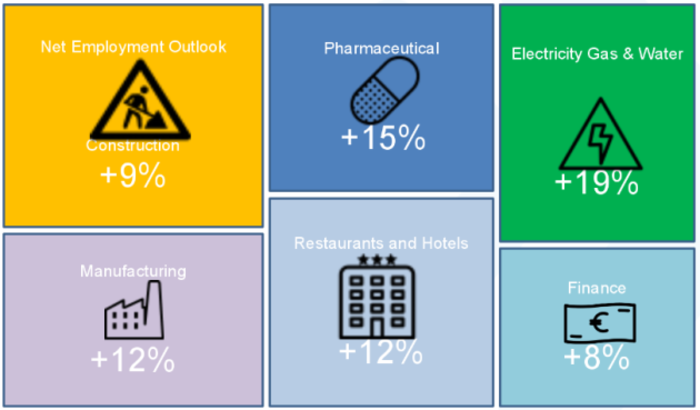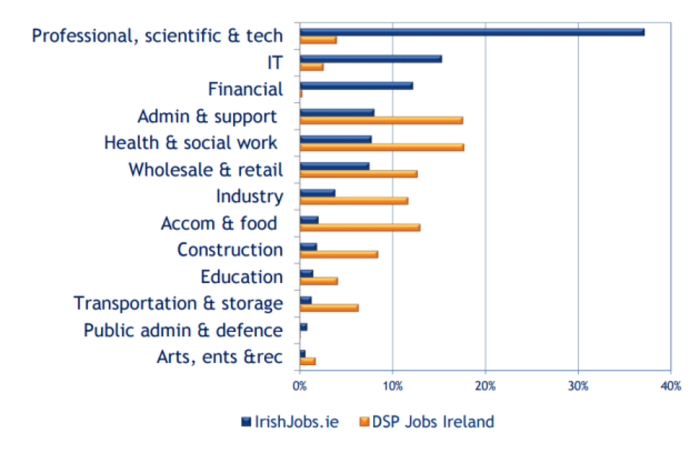Recruiters are selling a post-recession Ireland to expats, but it's not quite a jobs nirvana
While there are big vacancies in some sectors, emigrants need to be realistic about what they’re returning to.
TEMPTING IRISH WORKERS back to the country can be a difficult ask with many of those driven to emigration after the crash carrying less-than-rosy memories of the jobs market.
But with some sectors now experiencing skills shortages, recruiters are busy selling the idea of post-recession Ireland to those who departed the island’s shores en-masse.
During the peak migration waves of 2012, nearly 1,000 Irish people were leaving the country every week – and even last year, there was a net outflow of Irish nationals that numbered in the tens of thousands.
With the unemployment rate now starting with a seven, however, for the first time since the end of 2008, people like John Murphy are busy targeting those hordes of mostly young expats with promises of work back home.
His employer, Experis Ireland, has launched a ‘No Craic Like Home‘ campaign based on painting a fresh picture of the country for those who emigrated to the likes of Australia and New Zealand in search of jobs.
Murphy himself only returned to the country this year after a stint living in the Antipodes and he says anyone thinking about making the return shouldn’t underestimate how long it takes to settle back into the way things are done in Ireland.
“It does take time to come back and settle in and I tell people who are considering coming home to prepare three to six months out and do as much ground work as you can from overseas.
“Network with companies in Ireland if you can and make them aware of who you are and what you’re looking to do.”
Nevertheless, Murphy says recruiters are now being forced to go overseas and bring talent into Ireland in many roles as the economy kept picking up.
“In a number of projects we are working on, we are finding there is definitely a candidate shortage at the moment, with opportunities for people across sectors like finance, IT, sales and marketing.
“Dublin is booming at the moment, Cork and Limerick aren’t far behind. But for the rest of the country, there is a bit of catching up to do.”
 John Murphy of Experis Ireland
John Murphy of Experis Ireland
Booming sectors
Recent reports back up Murphy’s claim that there is a high demand for IT workers in the country, however it’s not just the tech and scientific industries that are hungry for staff. As the property sector rebounds, there is also a growing need for skilled tradesmen in an industry that was decimated when the property bubble burst.
Denise O’Hare, a senior recruiter at Sigmar Recruitment, says all the departments in her agency are busy fielding calls from expats who want to book a one-way flight home. Not least among those finding a keen demand for staff is her own section, which is focused on providing workers to the financial services industry.
“As a recruiter, I see the jobs coming through and I would encourage anybody to come back, especially those in the funds industry, asset management and banking. It’s never been as good.”
 Vacancies in specific Irish sectors
Vacancies in specific Irish sectors
However despite the bullish talk about the jobs market, the country is still far from an employment paradise for many who return.
While some sectors, like the IT industry, have enjoyed significant average pay rises over the past five years, others are still worse off than they were half a decade ago – pointing to continuing problems for those job-hunting in those industries.
For Trudi McDonald, who came back to Ireland from Australia just before Christmas, it took several months of searching to find any suitable positions.
“It wasn’t as easy as I thought it would be. I think it’s positive on the jobs front for certain sectors, but the outlook from recruitment agencies and the media doesn’t show that it’s still very tough for those in certain lines of work,” she says.
“I understand finance and computing are big industries, but I studied journalism and wanted to get back into communications and found it tough to get my foot in the door.
“I ended back up doing admin and working as a personal assistant. It’s the same role I was working at in Australia, but I’m getting paid half of what I was being paid before coming home.”
Not a hard sell
And for many returning emigrants, the job options that open to them aren’t the only considerations when making the decision whether to move back.
Other well-publicised issues, particularly Ireland’s housing crisis and the accompanying problems with finding affordable accommodation, are often primary concerns.
Murphy admits that the cost and availability of housing does worry expats looking to come home, but it’s not a big enough of a deterrent for most in his experience.
“Dublin is quite similar to the Sydney or Melbourne market in terms of trying to find an apartment, the cost of living is the same and rent is similar.
“So paying rent and knowing how hard it is to find accommodation is not going to be a fear factor for anyone living in Australia.”

O’Hare adds that from her experience it’s not tough persuading most people now is the right time to come home.
“If the person has made the choice in their mind, there’s not a lot of convincing, it’s just information they want and need.
“People who have been away for five years, they might have forgotten the tax system and understanding the rental market. People have no clue about it if they have been away.”
Denise Slacke, who returned to Ireland from the US a few years ago when her visa expired, says it wasn’t easy leaving a good life behind only to battle the Irish rental market – but in the long run it was worth it.
“It’s especially hard when people show up to the viewing with deposits and references in their hands because you know they will be favoured over you, but having said that, it’s not impossible.
“It took a good six weeks of constantly trawling through listings and going to viewing after viewing, but it certainly shouldn’t put anyone off coming home.”






